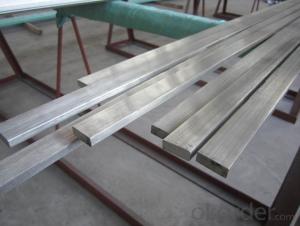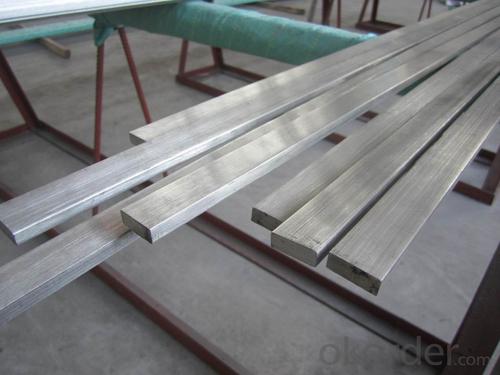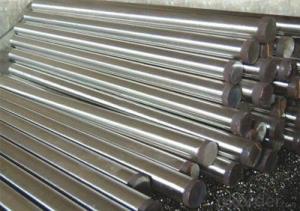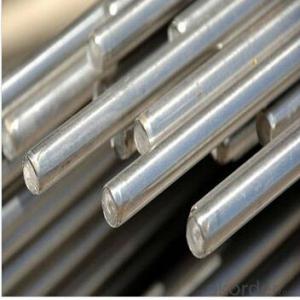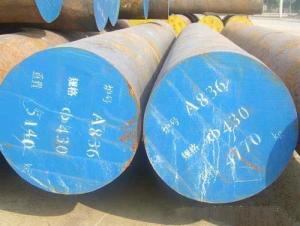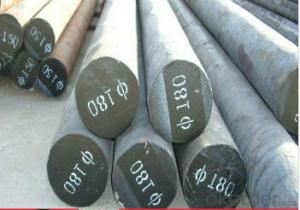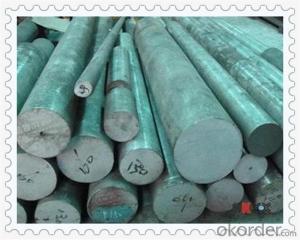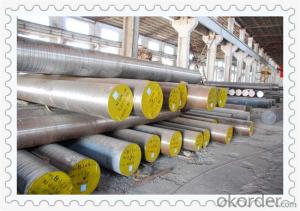SUP3 Spring Steel Alloy Round Bar and Plates
- Loading Port:
- Tianjin
- Payment Terms:
- TT OR LC
- Min Order Qty:
- 25 m.t.
- Supply Capability:
- 50000 m.t./month
OKorder Service Pledge
OKorder Financial Service
You Might Also Like
Specification
SUP3 Spring Steel Alloy Round Bar and Plates
Product Description:
1. Steel Grade: SUP3, 65Mn
2. Diameter: 16mm-300mm
3. Length: 6m,9m,12m
4. Shape: round bar, flat bar, square bar
5. Technique: Hot rolled, cold drawn, forged
Specification:
Material | 50Mn | Round bar | Dia(mm) | 16-600 |
Process | EAF + LF + VD + Forged + Heat Treatment (optional) | Length (mm) | Max 12000 | |
Heat treatment | Normalized / Annealed / Quenched / tempered | Flat bar | Thickness(mm) | 8-500 |
Delivery condition | Hot forged +Rough machined (black surface after Q/T)+ Turned (optional) | Width(mm) | 70-200 | |
Test | Ultrasonic test according to SEP 1921-84 D/d | Length (mm) | Max 12000 |
Chemical Composition:
C | Si | Mn | Cr | Ni | Cu |
0.5~0.8 | 0.17~0.37 | 0.25~1.2 | ≤0.25 | ≤0.30 | ≤0.25 |
Packing and Delivery:
Packing in bundle package or as your requriements.
Delivery Detail: About 45 days after confirming order.
Usage and Applications
1. Steel round bar is used in a large number of architectural and engineering structures. Or it can be used in construction of plants for the production of steel house frames, high-voltage transmission towers, bridges, vehicles, boilers, containers, ships, etc.
2. And we can use this kind of product on the performance of the mechanical parts if the demand is not very high.
3. Some especial material steel round bar can be used for main shaft of steamer, hummer shank, with big section and supper force.
Product Show:
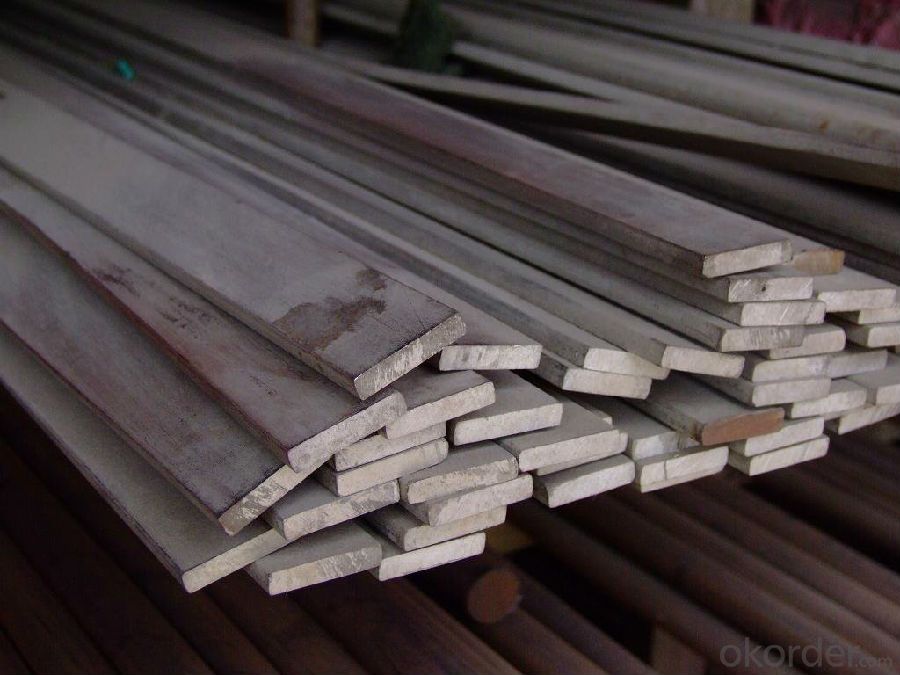
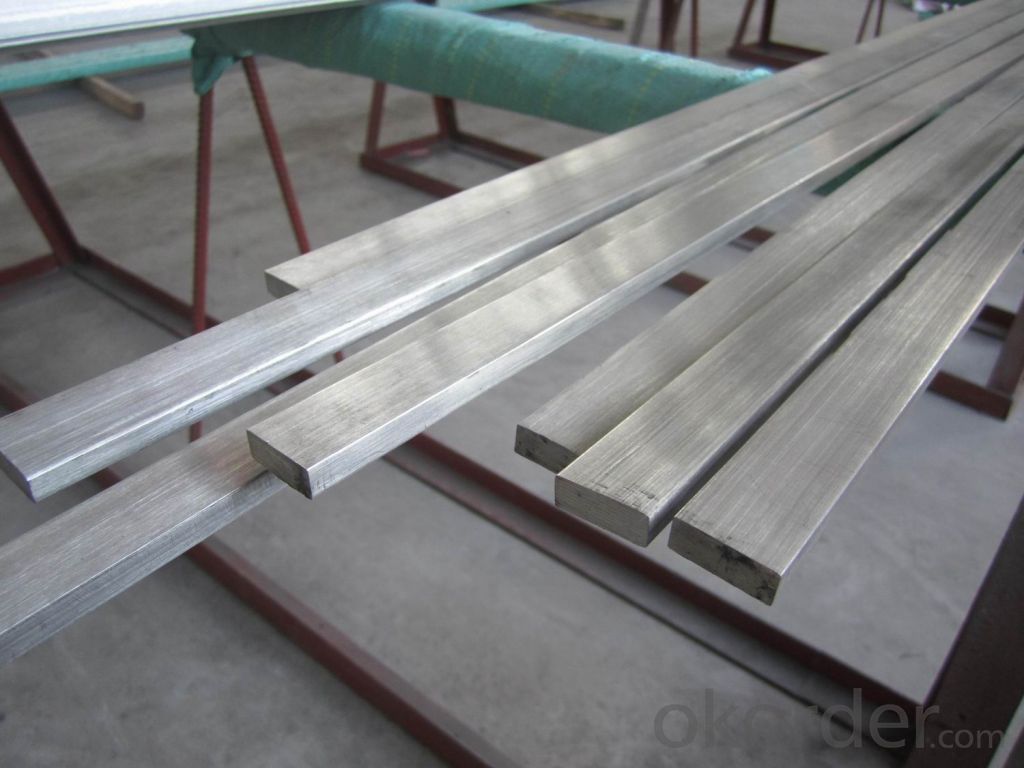
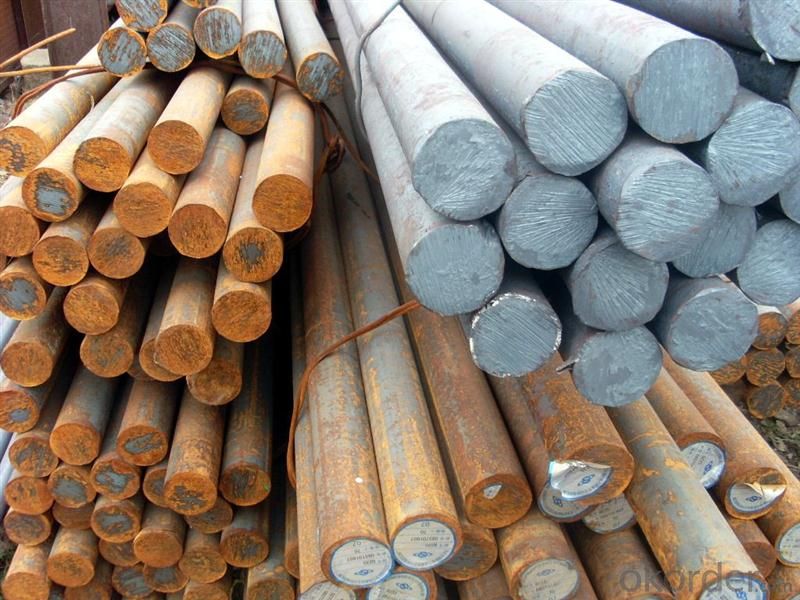
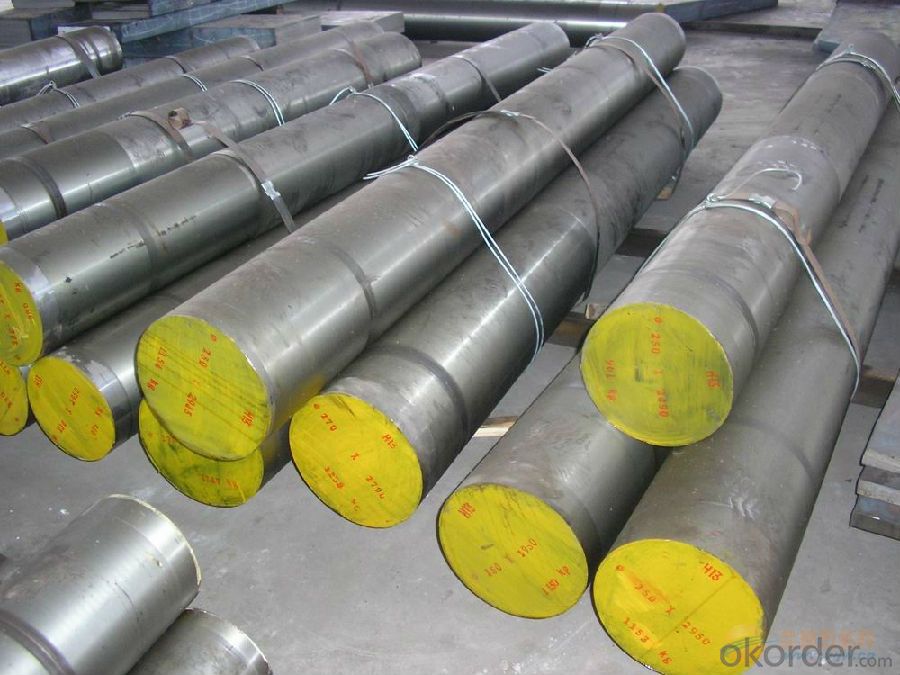
- Q: How is heat-resistant steel used in the production of furnaces and boilers?
- Heat-resistant steel is used in the production of furnaces and boilers due to its ability to withstand high temperatures. It is utilized in various components such as heat exchangers, tubes, and piping systems, ensuring efficient heat transfer and preventing structural damage. This steel's resistance to oxidation and corrosion guarantees longevity and reliability, making it an essential material for manufacturing furnaces and boilers.
- Q: How are nickel-based alloys used in the aerospace industry?
- Nickel-based alloys are extensively used in the aerospace industry due to their superior strength, high temperature resistance, and excellent corrosion resistance properties. These alloys are commonly employed in the construction of aircraft engines, turbine blades, and exhaust systems. They help improve engine efficiency, enhance fuel economy, and ensure safe and reliable operations in extreme conditions, making them crucial for the advancement of aerospace technology.
- Q: What are the properties of ultra-high-strength alloy steel?
- Ultra-high-strength alloy steel possesses exceptional strength, hardness, and toughness, making it ideal for demanding applications. Due to its high carbon content and alloying elements such as chromium, nickel, and molybdenum, it exhibits outstanding resistance to wear, corrosion, and heat. Additionally, its superior mechanical properties enable it to withstand heavy loads, impacts, and extreme environments, making it a preferred choice in industries like aerospace, automotive, and construction.
- Q: What are the specific requirements for special steel used in the nuclear fuel industry?
- The nuclear fuel industry imposes stringent and demanding requirements on special steel. These requirements are crucial to guarantee the safety and reliability of nuclear power plants. Here are some of the key specifications for special steel used in this sector: 1. Withstanding high temperatures: The special steel employed in the nuclear fuel industry must have the ability to endure high temperatures without compromising its structural integrity. This is of utmost importance as nuclear reactors generate intense heat during their operation. 2. Resisting corrosion: The nuclear fuel environments can be highly corrosive due to the presence of hot and pressurized water, radiation, and chemical reactions. Special steel used in this industry must exhibit exceptional resistance to corrosion in order to prevent deterioration and maintain safety. 3. Resisting radiation: The nuclear fuel industry involves exposure to radiation. Special steel must possess outstanding resistance to radiation damage and embrittlement in order to ensure long-term structural integrity and avoid any risk of failure. 4. High strength and toughness: Special steel used in the nuclear fuel industry should possess high strength and toughness to withstand the extreme conditions experienced within a nuclear reactor. This guarantees that the steel can endure the pressure and stress exerted on it during reactor operation. 5. Low neutron absorption: Neutron absorption is a critical factor in nuclear reactors. Special steel used in this industry should exhibit low neutron absorption properties to prevent interference with nuclear reactions and maintain reactor efficiency. 6. Stringent quality control and traceability: The manufacturing and fabrication of special steel for the nuclear fuel industry must conform to strict quality control procedures to ensure consistency and reliability. Traceability is also pivotal in identifying the origin and history of the steel, enabling comprehensive inspections and assessments. Meeting these specific requirements is crucial for the safe and efficient operation of nuclear power plants. Special steel used in the nuclear fuel industry must undergo rigorous testing, certification, and quality control processes to ensure compliance with these stringent specifications.
- Q: How is tool steel used in the manufacturing of molds and dies?
- Tool steel is used in the manufacturing of molds and dies due to its high hardness, toughness, and wear resistance properties. It is used to create molds and dies that are capable of withstanding the high pressures and temperatures involved in various manufacturing processes, such as injection molding and metal stamping. Tool steel ensures that the molds and dies maintain their shape and functionality over prolonged use, resulting in efficient and accurate production of various products.
- Q: What is the difference between special steel and regular steel?
- Special steel refers to steel that has been specially manufactured or treated to possess specific properties or characteristics that regular steel does not have. This can include higher strength, better corrosion resistance, improved ductility, or enhanced heat resistance. Regular steel, on the other hand, refers to the general classification of steel that is commonly produced and used in various applications without any specific modifications or unique attributes.
- Q: How does special steel perform in aerospace applications?
- Due to its exceptional performance and unique properties, special steel finds extensive use in aerospace applications. A primary reason for its usage lies in its high strength-to-weight ratio, a crucial factor in the aerospace industry where weight reduction is of utmost importance. Special steel alloys exhibit superior strength, enabling them to withstand the extreme conditions experienced during flight, including high temperatures, vibrations, and pressure changes. Moreover, special steel possesses excellent corrosion resistance, making it an ideal choice for aerospace applications where exposure to moisture and various chemicals is common. Its corrosion resistance ensures the durability and longevity of critical components, resulting in reduced maintenance and replacement costs. Furthermore, special steel offers excellent fatigue resistance, allowing it to endure repeated loading and unloading cycles without deformation or failure. This property is vital in aerospace applications where components must withstand cyclic stresses and maintain their integrity for extended periods. Additionally, special steel alloys can be readily fabricated and machined, facilitating the production of intricate and precise aerospace components. The ease of fabrication ensures efficient manufacturing processes and the ability to create complex designs, which are essential for optimizing performance and aerodynamics. In conclusion, special steel's exceptional strength, corrosion resistance, fatigue resistance, and ease of fabrication make it an invaluable material in aerospace applications. Its utilization in critical components, such as turbine blades, landing gears, and structural elements, guarantees the safety, reliability, and efficiency of aerospace systems.
- Q: What are the different types of bearing steel?
- There are several different types of bearing steel, including high carbon chromium bearing steel, high carbon high chromium bearing steel, and high carbon chromium molybdenum bearing steel.
- Q: How is special steel used in the manufacturing of industrial machinery?
- Special steel is used in the manufacturing of industrial machinery due to its exceptional strength, durability, and resistance to high temperatures and corrosion. It is commonly employed to create components such as gears, shafts, bearings, and tools, ensuring optimal performance and longevity of the machinery in demanding industrial environments.
- Q: How does special steel perform in corrosion fatigue conditions?
- Special steel is known for its exceptional performance in corrosion fatigue conditions. Corrosion fatigue refers to the combined effect of corrosion and cyclic loading, which can significantly degrade the mechanical properties of materials over time. However, special steel is specifically designed and alloyed to resist corrosion and maintain its structural integrity under these challenging conditions. The high corrosion resistance of special steel is achieved through the addition of alloying elements such as chromium, nickel, and molybdenum. These elements form a protective oxide layer on the surface of the steel, which acts as a barrier against corrosive agents. This oxide layer effectively prevents the penetration of moisture, oxygen, and other corrosive substances, reducing the likelihood of corrosion initiation and propagation. Furthermore, special steel exhibits excellent fatigue strength, allowing it to withstand cyclic loading without premature failure. Its unique microstructure, which is usually martensitic or austenitic, provides superior mechanical properties and resistance to fatigue crack initiation and propagation. This ensures that the material can endure repeated loading cycles without compromising its structural integrity. In addition to its corrosion resistance and fatigue strength, special steel also possesses good ductility and toughness. These properties are crucial in corrosion fatigue conditions as they enable the material to absorb and redistribute stress effectively, preventing localized stress concentrations that can lead to crack formation and propagation. Overall, special steel's exceptional performance in corrosion fatigue conditions can be attributed to its high corrosion resistance, fatigue strength, ductility, and toughness. These properties make it an ideal choice for applications where materials are subjected to cyclic loading and corrosive environments, such as offshore structures, marine equipment, and oil and gas pipelines.
Send your message to us
SUP3 Spring Steel Alloy Round Bar and Plates
- Loading Port:
- Tianjin
- Payment Terms:
- TT OR LC
- Min Order Qty:
- 25 m.t.
- Supply Capability:
- 50000 m.t./month
OKorder Service Pledge
OKorder Financial Service
Similar products
Hot products
Hot Searches
Related keywords
